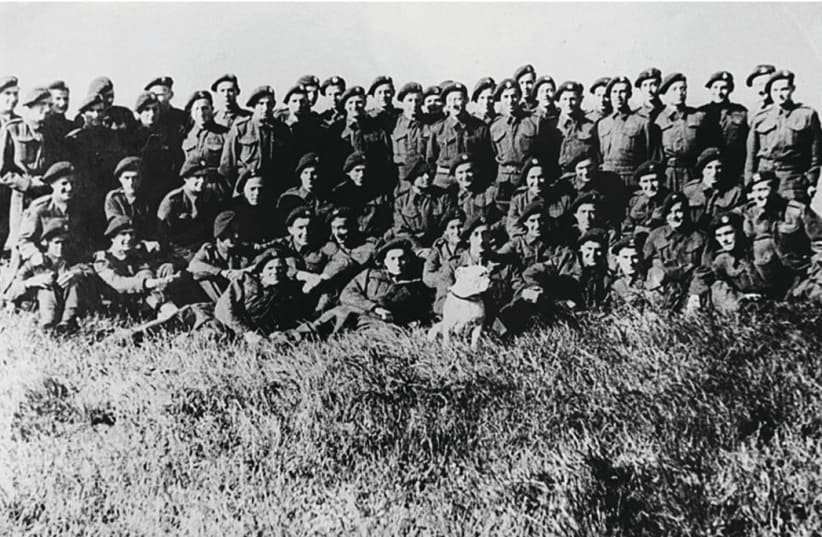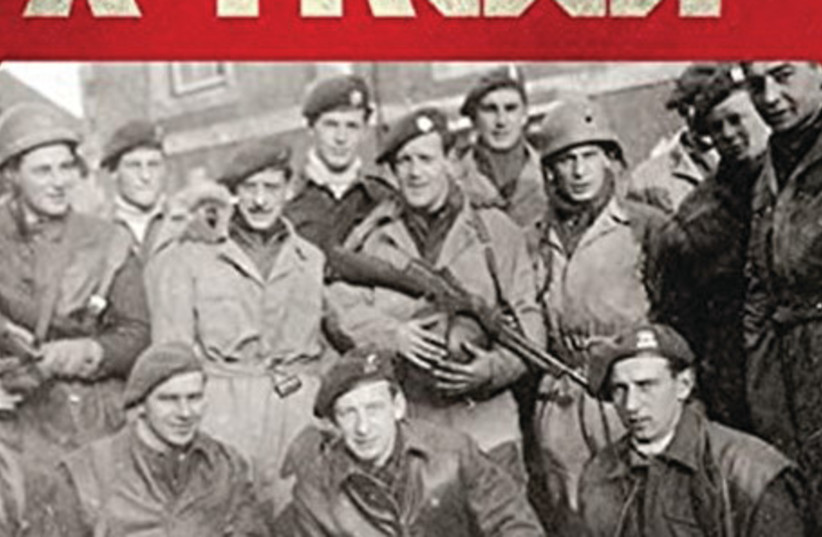World War II ended in Europe on May 8, 1945 – more than 76 years ago. Yet there are still amazing as-yet-untold stories emerging. This one, by Hunter College Professor Leah Garrett, is particularly stunning – a book about 87 Jewish commandos, an unlikely band of brothers, who together played a decisive role in defeating the hated Nazis.
Of the 87 Jewish commandos, Garrett notes that “more than half were killed, wounded or disappeared without a trace…. Yet even the troopers whose incredible exploits we do know about have not yet gotten their due.” Her book rights this wrong, at long last.
In her June 21 Time Magazine article, Garrett sets the stage. It is June 1942, the darkest period in World War II:
“The Germans seem to be unstoppable. Desperate to change the course of the war, Winston Churchill and his chief of Combined Operations decide to create a commando unit of Jewish refugees. Many of them were in concentration camps before their escape to the United Kingdom and most have lost their families to the Nazis. They came from German and Austria as teenagers, and when the war broke out were interred as enemy aliens, often in horrific conditions in Australia and Canada. For them the war is personal, and they will stop at nothing to defeat the Nazi menace. They take the fight to the enemy with both counterintelligence and advanced fighting skills, a rare combination for modern warriors….
“The name [X Troop] was bestowed by Churchill himself, who noted, ‘Because they will be unknown warriors – they must perforce be considered an unknown quantity. Since the algebraic symbol for the unknown is X, let us call them X Troop.’”
“The men of X Troop carried out some of the most daring missions of the war, landing on D Day (June 5, 1944) and fighting all the way into the heart of Germany... Frequently wounded, they often simply walked out of field hospitals, returning to their units to continue the struggle. Even when the war was over, the X Troopers would be crucial in hunting down and convicting Nazis for war crimes.”
“When the X Troopers were called on to fight and shoot and kill, they did so both bravely and extremely effectively. They gathered crucial intelligence in the heat of battle and their interrogations of captured Germans uncovered important information on what the enemy was doing and had done. As both fearsome commandos and masterful interrogators, the X Troopers were central to the Allies’ success during the war and later to their denazification efforts.”
“I have spent the last few years diving deep into archives from all around the world, declassifying top secret files, and interviewing still living X Troop veterans and their families.”
HISTORY CAN be deadly dull and bone dry. That is how we academics are taught to write. But not this book. Garrett is fiercely passionate about X Troop and telling their story is for her clearly, intensely personal. Several of her family members, including her grandfather, fought the Nazis. Her book is painstakingly documented, with 297 footnotes. And she tells their stories none too soon – Garrett managed to interview the last two surviving members of X Troop, before they passed away.
I prefer to tell the book’s story in Garrett’s own words, gleaned from my own interview with her and other interviews on-line:
Holocaust and Heroism Remembrance Day is observed yearly on April 27. I’ve lived in Israel for 54 years. From the outset, Israelis struggled with the narrative of the Holocaust – that so many died seemingly without resistance. On April 27, we recount ghetto uprisings – valiant, heroic, but ultimately futile. Why is the X Troop story, 87 Jewish commandos who did arguably alter the course of the war, so very important at this time?
Garrett: [from her TIME article]: “As citizens of the troubled 21st C., when hatred is again rising around the world, we cannot ignore the story behind the story. It has never been more important that the incredible, optimistic tale of Jewish commandos fighting successfully against evil be told – and that these secret heroes of World War II finally get their due.”
Can you help me understand – after heroic feats as Jews to expunge the modern-day Amalek, none came to Israel, and few identified as Jews later. Many did not disclose their Jewish roots or even reveal they lost family in the Shoah. Why?
Garrett: “I think the answer varied by commando but generally – they fought and struggled so much during the war and were all Holocaust survivors, that I think most wanted an easier life after the war. In the afterword of the book I go deeply into this question you ask--that is the best place to look for my explanation of this. I think, as for the emigration patterns, most went where they had some connections. For instance, Manfred Gans had distant relatives in New York, so he came here, while his parents went to Israel, again due to family connections.”
Manfred Gans’s story is truly beyond the imagination. Garrett, in TIME, recounts his feats:
“One of the most remarkable of all is the story of Manfred Gans, an Orthodox Jew from Borken, Germany, who transformed into a near superman under the nom de guerre Fred Gray. Gans was at the forefront of the D-Day landings, killing and capturing and interrogating countless Nazis, and seizing crucial German beach defensives. Gans had many brushes with death in Normandy and escaped them all. He fought in Germany, Belgium and Holland.
“In the waning days of the war, he commandeered a Jeep and drove through the apocalyptic hellscape of Nazi Germany to Theresienstadt concentration camp, where he rescued his own parents.”
One of the two surviving members of the X-Troop with whom you spoke, before they passed away, was Paul Streeten (nee Paul Hornig). I am an economist, and long admired Streeten’s pioneering work on development economics – and was awe-struck to learn of his amazing feats in X-Troop. You note he was an athlete… and in his Wikipedia entry it is stated he started a drama group while waiting to be sent behind enemy lines.
Can you briefly recount what your interview was like and what was your impression of this remarkable man?
“I interviewed him through his daughter, Tish, because he was quite sick by the time I found out he was a commando. I sent his daughter questions and he answered them and she sent me his answers. I clearly got the sense from both of his children that he was not only a remarkable commando and economist but also a remarkable father.”
The second X Trooper you interviewed was “Victor Davies” who kept his identity secret to the grave. Why? What is his story?
“I interviewed him in person and I got the sense it was just too painful to discuss the Holocaust (and the murder of his parents) so he decided to ‘become’ the commando persona and told folks he was British so he wouldn’t have to discuss his loss. I discuss this is in a bit of detail in the afterword. He never told anyone later he was German or that his parents had disappeared without a trace after they sent him to safety in England. Some relatives of those commandos killed in war still insist that they remain buried under crosses.”
After the war ended, most soldiers were sent home. Not X-Troop – you note some went on to capture and interrogate Nazis, and went through documents. Can you supply some details not in your book?
“I covered what details I had in the book but what I didn’t really go into was that what they did was crucial in the Nuremberg trials and that because they were all from Germany and Austria they knew details that others wouldn’t. For instance, when Manfred Gans was sent back to his hometown after the war, he knew which locals were good to the Jews (just a few) and which had been evil and he used that knowledge in his efforts to clear the town of the Nazi evils. So this was an amazing aspect of what they did--using their personal pre-war knowledge of which Germans had been evil to the Jews in their denazification work.”
Quentin Tarantino’s 2009 film Inglorious Basterds about a similar avenging troop made over $321 million. Its fiction was far less amazing than your true story. You note that a film about X Troop is in the works. Any details that you can reveal?
“I wish I had details...but everything is moving SO slowly!”
Garrett describes a moving coda for one of the last X Troop members.
“Ian Harris passed away in 2012 at the age of 92. At the closing of the funeral service a Royal Marine bugler played the “Last Post” and then silence descended on the packed congregation. Mark [Ian’s son] stood up, looked at the crowd, grinned, raised the two-fingered salute his dad had learned in Aberdovey [or Aberdyfi, the Welsh village where X Troop had trained] and shouted [the words his father made him promise to say at the funeral]:
“Up yours, Adolf!”
LEAH GARRETT ends her fine book by saying, movingly, “Thank you to the X Troopers. You have been an inspiration to me and I am so grateful that I got to share your story with the world.”
And I say, thank you, Leah Garrett, for bringing us this incredible moving story of Jewish heroism.
The writer heads the Zvi Griliches Research Data Center at S. Neaman Institute, Technion and blogs at www.timnovate.wordpress.com
X Troop: The Secret Jewish Commandos of World War IIBy Leah GarrettMariner Books: 2021.$18.38; 407 pages

